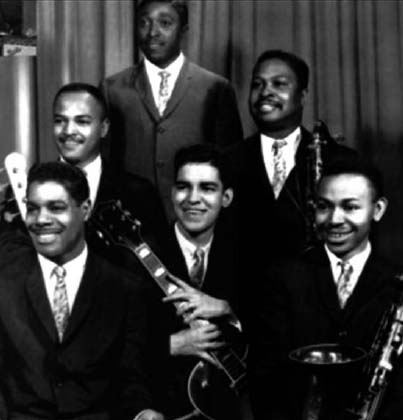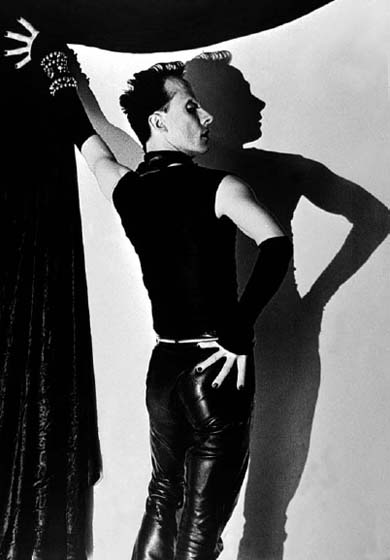The Encyclopedia of Dead Rock Stars (89 page)
Read The Encyclopedia of Dead Rock Stars Online
Authors: Jeremy Simmonds


The Funk Brothers - with Jamerson
middle left:
Motown’s backbone
Wednesday 3
Jobriath
(Bruce Wayne Campbell - Pennsylvania, 14 December 1946)
(Pidgeon)

Today, Jobriath is spoken of as the first openly gay rock star: well, he may have been gay, but only a small minority of fans – Elton John and Morrissey among them, no doubt – could name one solitary song of his. To be fair to him, Jobriath (variously Jobriath Boone, Jobriath Salisbury) was a more talented performer than he is widely given credit for, but the level of management and label hype propelling him would probably have capsized the career of anyone – perhaps even David Bowie, to whose songs Jobriath’s sagas of forbidden gay love and alien intervention were most often compared. Jobriath had, already, been a singer with late-sixties also-rans Pidgeon, and also appeared in an early cast of the musical
Hair.
But signed as a solo ‘force’ with Elektra in 1972, he was a dismal commercial failure: after two albums,
Jobriath
(1973) and
Creatures of the Street
(1974), Elektra ditched the singer – who subsequently moved into cabaret, re-emerging as Cole Berlin. One of rock’s earliest AIDS-related casualties, Jobriath died a recluse in his apartment at the Chelsea Hotel – the scene of Nancy Spungen’s death five years previously. The singer’s body is believed to have not been discovered until several days after his passing.
Despite denial from its director Todd Haynes, many claim that Ewan McGregor’s character in the 1998 movie
Velvet Goldmine
was based on a combination of Jobriath and Iggy Pop. Morrissey, meanwhile, attempted to hire Jobriath for a 1992 tour, unaware that the singer had been dead for almost a decade.
Saturday 6
Klaus Nomi
(Klaus Sperber - Bavarian Alps, Germany, 24 January 1944)

An even more curious gender-bending performer than Jobriath was Klaus Nomi; by tragic coincidence, he died just three days later – his ultimate fate eerily similar.
Nomi began his working days as an usher at the Berlin Opera, his postperformance renditions of whatever had gone before proving popular with colleagues. But the significant difference between Nomi and Jobriath was that he, unlike his US counterpart, was Bowie-approved. The pair had met after Nomi – now relocated to New York, where he worked as a pastry chef at the World Trade Center – was approached by the British star to back him on a 1979 television appearance. Dressed like a cross between a kabuki robot and a box of mid-price chocolates, Nomi straddled the parallel worlds of rock and disco, his voice similarly vaulting between counter-tenor and ear-splitting falsetto as he camped his way through covers of popular tunes and opera. Footage of one of his most distinctive performances, ‘Total Eclipse’, was memorably broadcast by the BBC’s
Old Grey Whistle Test
in 1980 – RCA saw fit to sign him up as a result.

Klaus Nomi: A shadow of his former self
‘Klaus Nomi was rock’s queerest exponent.’
Rupert Smith, writer
But, following a 1981–2 world tour, Nomi’s near-skeletal appearance shocked New York friends; it was clear all was not well. Doctors, not yet fully aware of the effects of AIDS, acknowledged that his immune system had all but broken down and diagnosed a malignant skin sarcoma. Confined to his apartment, Klaus Nomi passed away quietly. His funeral appropriately involved Wagnerian-style thunder at deafening pitch and a black-clad siren cavorting at his casket.
Wednesday
17 Mikey Smith
(Michael Smith - Jamaica, 1954)

Graduating in 1980 from the Jamaica School of Drama, reggae poet Mikey Smith had already issued the dub poem for which he would be best remembered, the powerful ‘Mi Cyaan Believe It’ (1978). The latter, released on Island in the UK, had been written shortly after the young and politically motivated performer had represented Jamaica at the 11th World Festival of Youth and Students. Smith was an able though headstrong poet, prepared to speak passionately about the struggle against poverty faced by many in his homeland. Which often caused friction with his opponents.
On 16 August 1983, Mikey Smith attended a political meet at Stony Hill where the Jamaica Labour Party Minister for Culture/Education, Olivia Grange, addressed the gathering. Smith – a fierce opponent of her views – allegedly heckled the speaker, for which he was greatly chastised. Twenty-four hours later, he was set upon by JLP activists, who apparently attacked him with stones: one blow to the head proved fatal and the young reggae artist died later that day. Nobody has ever been brought to account over the slaying. In the words of fellow poet Linton Kwesi Johnson, ‘Smith was one of the most interesting, original poetic voices to emerge from the English-speaking Caribbean during the twentieth century. His poetry was a means of giving hope, building awareness as a part of the whole process of liberation.’
SEPTEMBER
Thursday 15
Prince Far I
(Michael James Williams - Spanish Town, Jamaica, 1944)

In an increasingly dark year for reggae, Prince Far I became the latest Jamaican star to be murdered. Known as ‘The Voice of Thunder’, this genial giant of a DJ proved one of the most original stylists in seventies dub: although he was not much of a singer, his stream-of-consciousness rants were a marvel to behold. An imposing figure, Far I (then plain old Michael Williams) was employed by Clement ‘Coxsone’ Dodd as a bouncer at the fabled Studio One, only realizing his recording potential when veteran toaster DJ King Stitt failed to make a session. Far I stepped in and the result was one of his finest pieces of improvisation, ‘Queen of the Minstrel’ (1970). Taking a while to find his true voice, Prince Far I had to wait until 1976 to record a full debut album,
Psalms For I,
under the name by which he was to be known for the rest of his days. The year after, Far I’s seminal ‘Heavy Manners’ single wryly addressed Jamaica’s overly stringent anti-crime policies. The powerful and widely felt diatribe divided Jamaican public opinion (the likes of Culture had already prophesied an upcoming apocalypse in their ‘Two Sevens Clash’) – but Prince Far I’s polemic would nonetheless sound hollowly ironic just six years later. Far I established his own Cry Tough label – providing an outlet for himself and artists of similar standpoint – while also working with the notorious Roots Radics (aka Dub Syndicate). By the turn of the decade Far I was making considerable headway in Britain, where he was spending more and more time, his records regularly championed by John Peel and On-U label founder Adrian Sherwood.
In fact, all seemed well for this powerhouse of Jamaican culture until his death in 1983 at the hands of armed robbers who had broken into his Kingston home. Prince Far I – the latest victim of the Jamaican street crime that the government had singularly failed to quell – was shot twice in the stomach, and died at the scene.
NOVEMBER
Tuesday 8
Little James Booker
(James Carroll Booker III - New Orleans, Louisiana, 17 December 1939)
(Booker Boy & The Rhythmaires)

